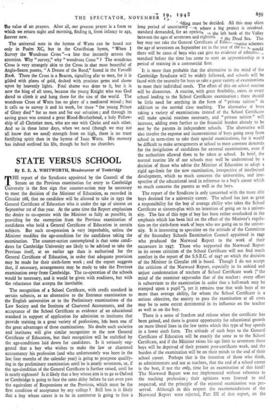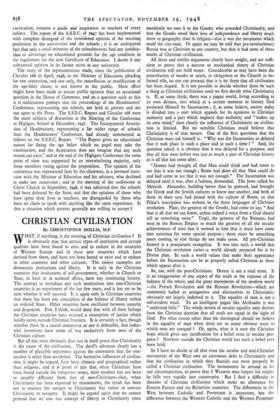STATE VERSUS SCHOOL
ByE. E. A. WHITWORTH, Headmaster of Tonbridge
THE report of the Syndicate appointed by the Council of the Senate on the Previous examination for entry to Cambridge University is the first sign that counter-action may be necessary to meet the decision of the Minister of Education, as recorded in Circular 168, that no candidate will be allowed to take in 1951 the General Certificate of Education who is under the age of sixteen on September 1st of that year. At the same time the Report emphasises the desire to co-operate with the Minister as fully as possible, in providing for the exemption from the Previous examination of candidates who hold a General Certificate of Education in certain subjects. But such co-operation is very improbable, unless the Minister modifies the age-condition for the candidates taking the examination. The counter-action contemplated is that some candi- dates for Cambridge University are likely to be advised to take the Previous itself, at an earlier age than is authorised for the General Certificate of Education, in order that adequate provision may be made for their sixth-form work ; and the report suggests that, if necessary, arrangements may be made to take the Previous examination away from Cambridge. The co-operation of the schools would be necessary, and it would be given with readiness, but with the reluctance that accepts the inevitable.
The recognition of a School Certificate, with credit standard in certain subjects, as an alternative to the Entrance examination to the English universities or to the Preliminary examinations of the Law Society and the Institute of Chartered Accountants, and the acceptance of the School Certificate as evidence of an educational standard in support of application for admission to institutes that provide training in a great variety of professions, hls been one of the great advantages of these examinations. No doubt such societies and institutes will give similar recognition to the new General Certificate of Education, but their recognition will be stultified by the age-conditions laid down for candidates. Is it seriously sug- gested that a boy who wishes to make the law or chartered accountancy his profession (and who unfortunately was born in the last four months of the calendar year) is going to postpone qualify- ing in the preliminary examination until he is nearly seventeen, or, if the age-condition of the General Certificate is further raised, until he is nearly eighteen? Is it likely that a boy whose aim is to go to Oxford or Cambridge is going to face the same delay before he can even pass the equivalent of Responsions or the Previous, which must be the first condition of acceptance by any college ?. Still less is it likely that a boy whose career is to be in commerce is going to face a
-"ding must be decided. All this may often long period of uncertainty ---k where a big project is involved. standard demanded, for an operant, ,s the left bank of the Valley
between the ages of seventeen and eighteen. the Dead Sea. The boy may not take the General Certificate of Educ........native schemes
the age of seventeen on September 1st in the year of the T, there will be cases of boys who can give no evidence of educawtos standard before the time has come to start an apprenticeship or a period of training in a commercial firm.
It is more than probable that the alternative in the mind of the Cambridge Syndicate will be widely followed, and schools will be faced with the necessity for boys to take a great variety of examinations to meet their individual needs. The effect of this on school routine will be disastrous. A routine, with great flexibility, exists in every school leading to the School Certificate examination ; there should be little need for anything in the form of " private tuition " in addition to the normal class teaching. The alternative of boys taking a variety of examinations instead of the School Certificate will make special routines necessary, and " private tuition " will increase, adding even further to the financial burden already to be met by the parents in independent schools. The alternative will also involve the expense and inconvenience of boys going away from school in term-time to take their special examinations, for it would be difficult to make arrangements at school to meet constant demands for the invigilation of candidates for external examinations, even if the authorities allowed them to be taken at school. In brief, the normal routine life of our schools may well be undermined by a decision of those who advise the Minister of Education to adopt a rigid age-limit for the new examination, irrespective of intellectual development, which so much concerns the universities, and irre- spective of the educational need in reference to a boy's career which so much concerns the parents as well as the boys.
The report of the Syndicate is only concerned with the more able boys destined for a university career. The school has just as great a responsibility for the boy of average ability who takes the School Certificate at sixteen-plus with no intention of going on to a univer- sity. The fate of this type of boy has been rather overlooked in the emphasis which has been laid on the effect of the Minister's regula- tion on the sixth-form work of boys who are going on to the univer- sity. It is interesting to speculate on the attitude of the Committee of the Secondary Schools Examination Council appointed in 1941 who produced the Norwood Report to the work of their successors in 1947. Those who supported the Norwood Report in its severe criticism of the School Certificate will not find much comfort in the report of the S.S.E.C. of 1947 on which the decision of the Minister in Circular 168 is based. Though I do not accept the criticism of the Norwood Report, especially in its unkind and unjust condemnation of teachers of School Certificate work (" the mind of the examiner supersedes that of the teacher: every effort is subservient to the examination in order that a hall-mark may be stamped upon a pupil"), yet it remains true that with boys of no more than average ability, for whom the School Certificate is a serious objective, the anxiety to pass the examination at all costs may be to some extent detrimental in its influence on the teacher as well as on the boy.
There is a sense of freedom and release when the certificate has been gained, and there is greater opportunity for educational growth on more liberal lines in the few terms which this type of boy spends in a lower sixth form. The attitude of such boys to the General Certificate of Education will be exactly the same as to the School Certificate, and if the Minister raises his age limit to seventeen these boys will be deprived of their present post-certificate work, and the burden of the examination will be on their minds to the end of their school career. Perhaps that is the intention of those who think, as administrators and not as teachers, that the end of a school career is the best, if not the only, time for an examination of this kind! The Norwood Report was not implemented without reference to the teaching profession ; their opinions were listened to and respected, and the principle of the external examination was pre- served. Although in this respect the recommendations of the Norwood Report were rejected, Part III of that report, on the
curriculum, remains a guide and inspiration to teachers of every subject. The report of the S.S.E.C. of 1947 has been implemented with complete disregard of the considered opinion of the teaching profession in the universities and the schools ; it is an undisputed fact that only a small minority of the schoolmasters find any justifica- tion or advantage on educational grounds for the age condition in the regulations for the new Certificate of Education. I doubt if any substantial opinion in its favour exists at any university.
The story of the representations made, since the publication of Circular 168 in April, 1948, to the Minister of Education, pleading for one concession, and one only, the cancellation or modification of the age-limit clause, is not known to the public. More effort might have been made to arouse public opinion than an occasional question in the House of Commons, and on a question such as this it is unfortunate perhaps that the proceedings of the Headmasters' Conference, representing 200 schools, are held in private and ace not open to the Press. The S.S.E.C. Report and Circular 168 were the main subjects of discussion at the Meeting of the Conference at Highgate School in December, 1947. The Incorporated Associa- tion of Headmasters, representing a far wider range of schools than the Headmasters' Conference, had already commented as follows on the S.S.E.C. Report. " The Report gives no educational reason for fixing the age below which no pupil may take the examination, and the Association does not imagine that any such reason can exist," and at the end of the Highgate Conference the same point of view was supported by an overwhelming majority, only three members voting against the proposition. The opinion of the conference was represented later by the chairman, in a personal inter- view with the Minister of Education and his advisers, who declined to make any concession ; and at the meeting of the conference at Christ Church in September, 1948, it was admitted that the schools had been defeated by the State, and that the opinions of those who have spent their lives as teachers, are disregarded by those who have no claim to speak with anything like the same experience. Is that a situation which parents generally are willing to accept ?



































 Previous page
Previous page